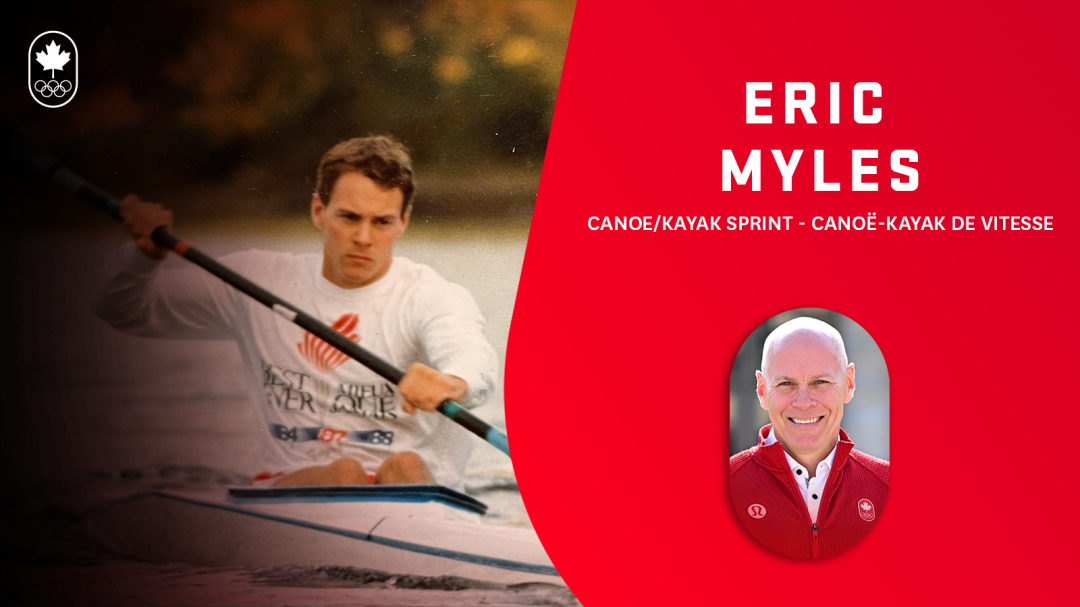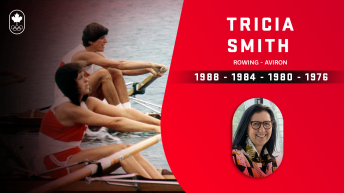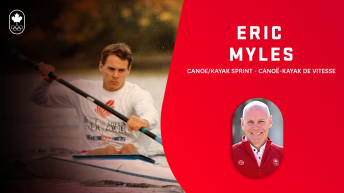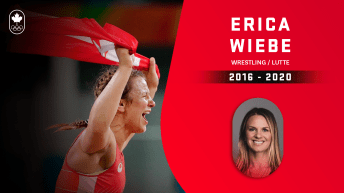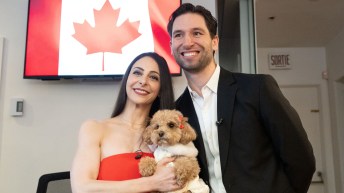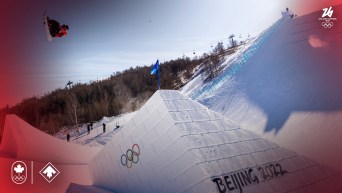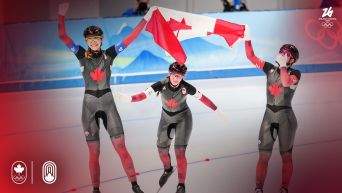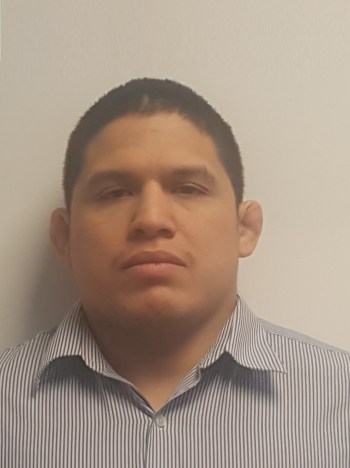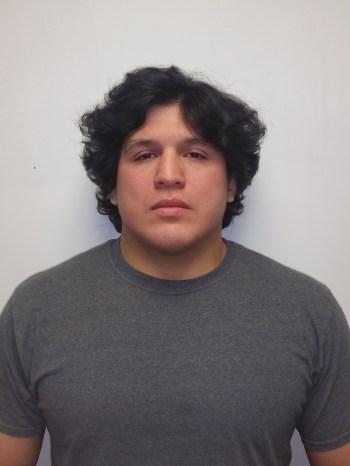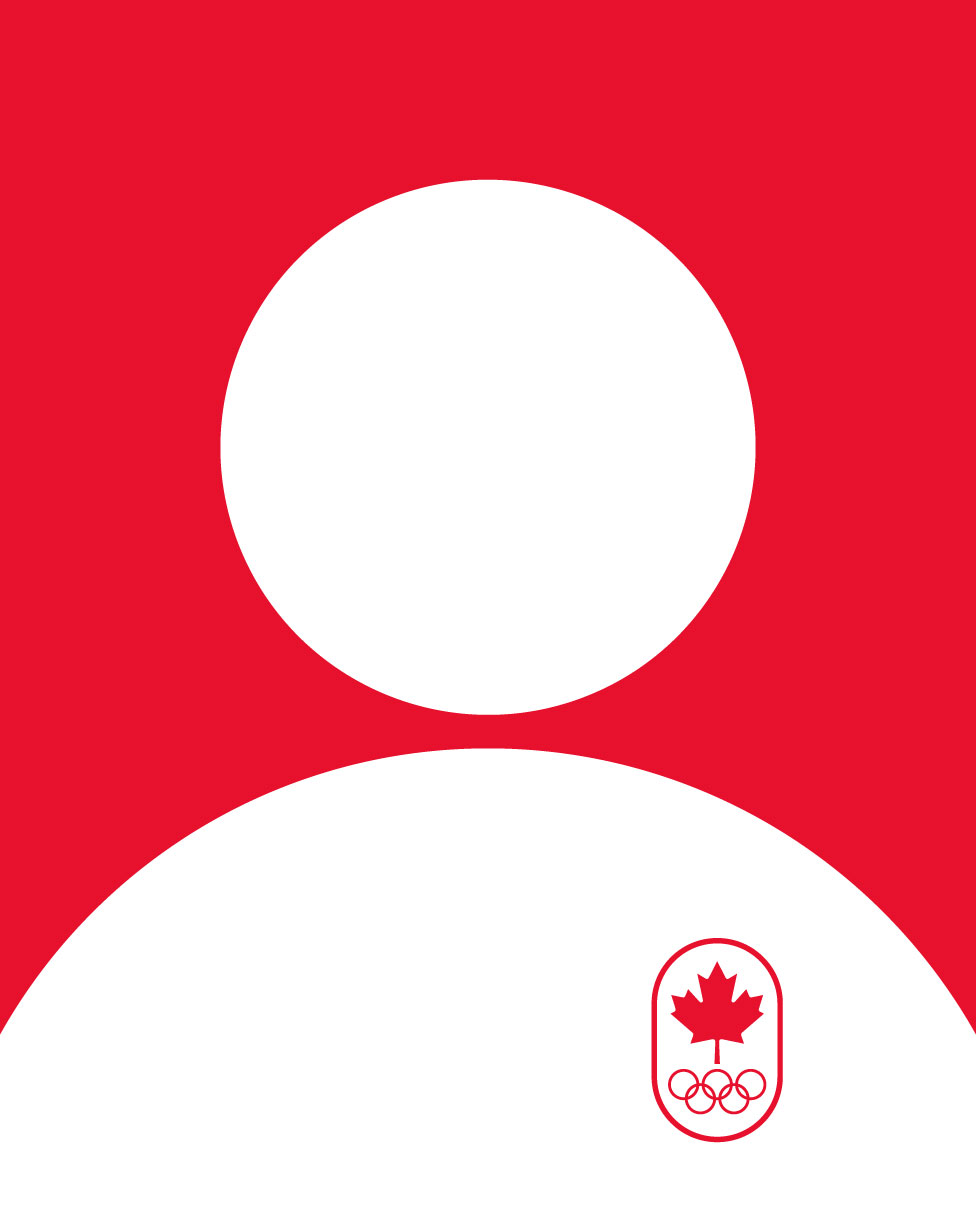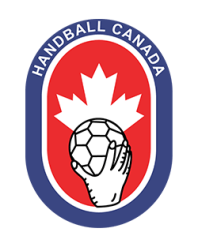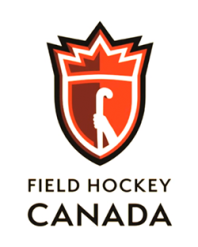Team Behind the Team: Meet Eric Myles, 1987 Pan American Games medallist in canoe/kayak and Chief Sport Officer at the COC
The Canadian Olympic Committee (COC) is proud to put athletes at the heart of everything it does. At all levels of our organization, from our Board of Directors to our interns, our team is made of people who truly believe in the power of sport – including an impressive group of Olympians, Paralympians, Pan American Games athletes, former national team athletes, recreational league athletes, and passionate sport lovers. In this series, we’ll share stories from members of our team who have competed at major multi-sport Games and who are now dedicating their professional lives to helping the next generation of Team Canada athletes live their dreams.
Eric Myles has been involved in high performance sports since 1981. As an athlete, Myles won a bronze medal in the K-2 500m event at the 1987 Pan American Games, but after a series of injuries, he retired from competition at age 23. Since then, he has devoted his life to the sporting world, first as a coach and then as an administrator and a builder. From 1992 to 2002, Myles was a director in the education sector where he had a big impact, including in the sport études programs. In 2002, he became Executive Director of Quebec en Forme, an organization that promotes an active and healthy lifestyle across the province. He joined the COC as Chief Sport Officer in 2014.
This interview has been edited for length and clarity.
What does your position as Chief Sport Officer entail?
The key part of my role is leading all the major Games, including the Olympics, Pan American Games, and Youth Olympics. But it’s important to note that we have evolved at the COC and do more than simply deliver the Games. We are also facilitators, leading from the back, sometimes even in areas where some might be surprised to see the COC playing a role.
That’s evident in the second pillar of my work – the improvement of the Canadian sport system. When I joined in 2014, this was what I was hired to do. At that time, the notion of capacity building, or building relations and better governance with National Sport Organizations (NSOs), was not part of the COC mandate. We have been more precise in finding ways to improve the system with athlete leadership at the forefront. So, for example, working with our Athletes’ Commission and helping athletes to join different boards. Another thing close to my heart was the development of Game Plan to offer a number of tools and resources to help athletes feel at at their best both on and out of the field of play, to stay involved longer in sport and retire healthy, knowing they have the necessary tools to prepare to be and become positive citizens at every stage of their career. Years ago, I experienced a very tough transition when I ended my journey as an athlete and so I am very proud that athletes now have access to a program like this.
The newest aspect of the role is health and wellness. The COC used to have a Chief Medical Officer (CMO) who would work from contract to contract at Games. Coming out of the pandemic, I was looking for ways to improve on this. Since March 2023, we have a full-time CMO, Dr. Mike Wilkinson. His role is not just with the COC but he works with the sports system as a whole to ensure we have healthy athletes. A big part of his mandate is to have a clear network with other CMOs at the National Training Centres to provide support for the wellbeing of our athletes.
If we really want to improve in this health and wellness space, I felt we needed to have stability. When an athlete gets injured, they need to know they’re not stuck on their own. We have developed a network of specialists to help athletes with their physical and mental health. The other important part of the role is building a safe environment. This holistic vision of developing and supporting athletes is key to bringing us to a better place by helping athletes perform better and have longer careers.
What are you most proud of accomplishing in your time at the COC?
I’m really proud of the growth of the organization. When I joined the senior leadership team, I asked for carte blanche to change the culture of who we are and how we work. It was not just me; it was the team. It’s solid and anchored now. I brought in many Olympians who gave us instant credibility because of who they are, their lived experience, and the values they hold dear.
Their knowledge and experience within the system are undeniable assets to best help our athletes to give their top performances. It only adds to how skilled and experienced our passionate team is. At the end of the day, their success is my biggest source of pride.
Furthermore, with the restructuring dynamic of the COC, our organization stands out by the relevance and quality of the processes we have developed to care for our athletes. The training we offer, the policies we adopt, and our teams’ profile, all our steps are aligned with the same goal: to put the athletes at the centre of our work. We are a dynamic and innovative organization that unifies, both here at home and abroad and we are really proud of that as well.
How did your athletic and coaching career prepare you for your job at the COC?
The toughest moment of my athletic career was missing out on qualification for the 1988 Seoul Olympics by inches. I had been in Yugoslavia for the 1987 Summer Universiade, where my partner and I finished seventh. I was also a medallist at the Pan American Games in Indianapolis that year. Since Seoul was late in the fall of 1988, we had to be fast at different times of the year.
Some of us ended up overtraining. I got really sick as I dropped too much weight and ended up being hospitalized.
If I look at it from the perspective of what the COC is doing now with the CMO and the focus on health and wellness or programs like Game Plan, I would have had mentorship or support that didn’t exist then. Not to say that would have been the difference maker in my reaching the Olympics, but you never know.
From there, I got into coaching, which is where I believe I found what makes me tick. I’ve realized, looking back at my career, that I love developing and that I’m a builder. I was part of a new club where people in the sports community were laughing at us because we were so small. Then two buddies and I became the first athletes from the club to go to world championships. I was always as happy, or even happier, to see my teammates succeed. That really defined my career. The builder aspect came to the fore when I later approached Alberta to help coach and develop the sport in that province. They had never had anyone on the national team before because they didn’t have the human resources to develop athletes. I helped start a club, and within four years, we had seven athletes on the national team, and three went to the Olympics. That was the turning point for me in wanting to work to help improve the system.
One of the key things I’ve carried with me into my role at the COC, which comes from my background as an athlete in a team boat, is the belief that if you surround yourself with strong people and trust your partners along the way, that’s when the boat really glides and flies.
Talk to us about the preparation and planning the COC had to start ahead of Paris 2024. What was the biggest challenge to this day? Your biggest success?
One of our big achievements is the role the COC plays at these Games. For the first time, we are members of the Coordination Commission, making our organization recognized and proactive in the eye of the IOC. I am also proud of the quality of the relationships we have built abroad, especially with the whole CNOSF (French National Olympic and Sports Committee) and the Paris 2024 Olympic Games Organizing Committee. Our actions and investments led to standing among the most influential NOCs even if we are not the largest ones.
Paris 2024 is also a challenge to reinvent ourselves in the way we deliver Games. Each time we learn more and that will be the case again this summer in France.
Our biggest challenge remains the success of our athletes with their wellbeing and safety at the forefront of our approach. I am proud that the COC is now recognized as a performance ally. I wish that our partners and key stakeholders in the delivery of these Games share our vision.
What are you looking forward to the most at the 2024 Paris Olympic Games this summer? How do you think these Games will stand out?
These Games represent many things for me. They are charged with symbolism for the French-speaking world and the close relationship Canada holds with France. It’s a great opportunity to strengthen these links between our two countries and to make our heritage shine. We speak beyond sport, including our common culture, historical links and strong symbols. Our swimming team will host a training camp in Normandy, not far from the landing beaches. Canada Olympic House at the Cité des Sciences et de l’Industrie will be located right next to Club France at parc de la Villette. All these symbols are reflective of our continued commitment to the international and French-speaking sports movement.
Paris 2024 will also mark our return to Games like those we experienced prior to the pandemic, in a world that has evolved and is filled with challenges. The world will gather around the most important international sporting event. I have no doubt that our athletes will be able to inspire and unify Canadians from coast to coast to coast.
Finally, these Games are in line with the continual improvement of Team Canada’s performances. At each Games, our athletes never stop improving and I am convinced they will shine even more in Paris. I am looking forward to seeing the surprises they have in store for us.

